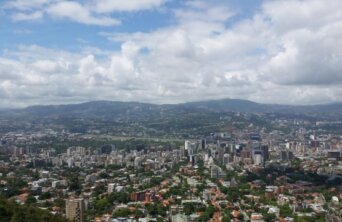- About
- Topics
- Picks
- Audio
- Story
- In-Depth
- Opinion
- News
- Donate
-
Signup for our newsletterOur Editors' Best Picks.Send
Read, Debate: Engage.

| topic: | Renewables |
|---|---|
| located: | Venezuela |
| editor: | Ellen Nemitz |
Venezuela is suffering one of the worst modern global economic and humanitarian crises. Extreme poverty, hunger, hyperinflation, unemployment, violence and low incomes have driven at least 7 million people away from the country over the past decade, according to data from the United Nations Agency for Refugees (UNHCR).
Although political instability, international sanctions and macroeconomic decisions contributed to the nation's decline, Venezuela's heavy dependence on oil exports dealt the most significant blow.
Venezuela has long relied on its vast oil reserves to develop its economy, neglecting other sources of income. According to the BBC, Venezuela made $750 billion from oil exports between 2004 and 2015. However, oversupply in the global oil market caused prices to drop, leading to the country's downfall.
Now, as reported by El Pais, Venezuela is slowly rising from the ashes. With inflation no longer as high, the increase in the value of the Venezuelan Bolivar has created some breathing room. This is in part owing to oil production boosting the economy after the lifting of sanctions. Moreover, natural gas exports to Europe have been negotiated to add an extra source of income for this regrowing economy.
But these activities come at a high environmental cost, and a reliance on oil is unsustainable. According to a report released by the Observatory of Political Ecology of Venezuela, 2022 saw 86 oil spills in the Latin American nation - thirteen more than the year before - a result of a lack of maintenance investments in ageing structures and proper regulation policies, according to News agency Mongabay.
"Oil spills in Venezuela constitute a serious socio-environmental problem that affects both marine and land ecosystems," reads the Observatory's document, adding that the leaks can impact even agribusiness. "Likewise, fisherpeople and coastal communities suffer the consequences of oil spills daily, with no response from state bodies to this common environmental tragedy."
Venezuela has been failing to protect its environment in other ways, too. Mongabay lists the rise of gold mining in rainforests, expansion of cattle ranching at the cost of deforestation, poor waste management and wealthy people exploring and destroying protected areas for their leisure as contributing factors to Venezuela's worsening environment.
Water scarcity and other environmental problems typically aggravated by climate change, in turn, profoundly affect the population.
The world must immediately halt new oil and gas development and transition rapidly to renewable energy to stop climate change, conclude many reputable bodies, including Nature, the Intergovernmental Panel on Climate Change and the UK House of Commons.
In addition, fossil fuels are only profitable for a tiny percentage of the rich in the country: according to Transparencia Venezuela, at least 65 percent of Venezuelans still need some assistance for basic needs. Therefore, any economic recovery should include a clean energy transition, prioritising the environment to build a development strategy that can last and be suitable for all.
Image by Jorge Campos.
